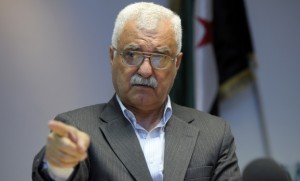 A Syrian opposition spokesman lambasted the government’s call for dialogue Tuesday, marking yet another stalemate in the country’s 19-month deadly conflict.
A Syrian opposition spokesman lambasted the government’s call for dialogue Tuesday, marking yet another stalemate in the country’s 19-month deadly conflict.
“No Syrian is willing to sit down with any of these killers in the Syrian government who have been responsible for every single drop of blood that have been shed in Syria,” Syrian National Council spokesman George Sabra told CNN from Paris.
“From day one, the regime played the same tune, call(ing) for political solution while ordering mass killing all across the homeland. They keep putting themselves in a political corner … while their military keeps its systematic killing spree, murdering hundreds of innocent men and women every single day.”
At the U.N. General Assembly on Monday, Syrian Foreign Minister Walid Moallem made his call for a dialogue and accused other states of promoting “terrorism” in his country.
Moallem slammed international calls for President Bashar al-Assad to step down, saying such rhetoric amounts to a “blatant interference in the domestic affairs of Syria, and the unity of its people and its sovereignty.”
The region: Mounting refugee crisis divides Turkey
Syria’s civil war is now a heated political issue inside Turkey, a country that has been sympathetic toward Syrian dissidents and has hosted more than 93,000 refugees — more than any other neighboring country.
Some protesters have taken to the streets of Antakya to decry their country’s handling of the Syrian civil war.
The Turkish government seems to be bowing to domestic pressure from some Turks who are fed up with the Syrian refugees and angry at Turkish government support for Syrian rebels.
Turkish Prime Minister Recep Tayyip Erdogan vowed this week to continue supporting the Syrian opposition, but appears to be backpedaling on his pledge to keep an open border to fleeing Syrians.
Meanwhile, thousands of Syrians have been stuck for weeks in squalid conditions at a Turkish border fence, begging to be let in.
State media: Security operations near Damascus almost over
“Heroic armed forces” detected and disabled improvised explosive devices in the Damascus province city of Harasta, the state Al-Baath said, predicting the imminent demise of “terrorists” in the area.
“… Here we are witnessing the security operation in its last hours,” Al-Baath said.
Yet deadly violence flared nearby and across the country.
At least 17 people were killed Tuesday morning, including nine in suburban Damascus, the opposition Local Coordination Committees of Syria said.
The LCC says the total number of civilians and opposition fighters killed in the conflict has reached roughly 28,000
More than 24,000 of them were civilians, the activist group said. Thousands of Syrian troops have also reportedly been killed.
CNN is unable to independently confirm casualty reports as the Syrian government has severely limited the access of international journalists.
Background
The Syrian conflict broke out in March 2011 after unarmed protesters, inspired by the success of popular uprisings in Egypt and Tunisia, took to the streets demanding political reform.
The movement devolved into an armed conflict after a brutal and continuing crackdown by government forces.
Foreign Minister Moallem spoke Monday to the U.N. General Assembly just days after world leaders painted a grim picture of the conflict.
Syria has dominated much of the General Assembly discussion — on stage and on the sidelines — as world leaders struggle to find a way to resolve the war that has left the Security Council hopelessly deadlocked, with China and Russia opposing some of the toughest measures proposed.
The Security Council has been paralyzed by a division over how to halt the killing in Syria. Russia and China have blocked resolutions calling for al-Assad to transfer power and step down, saying the issue should be settled by Syrians.
Germany has slammed the U.N. Security Council for failure to act, and the United States, Britain and France announced they are backing increased support of non-lethal aid to the Syrian opposition.
CNN

Leave a Reply
You must be logged in to post a comment.